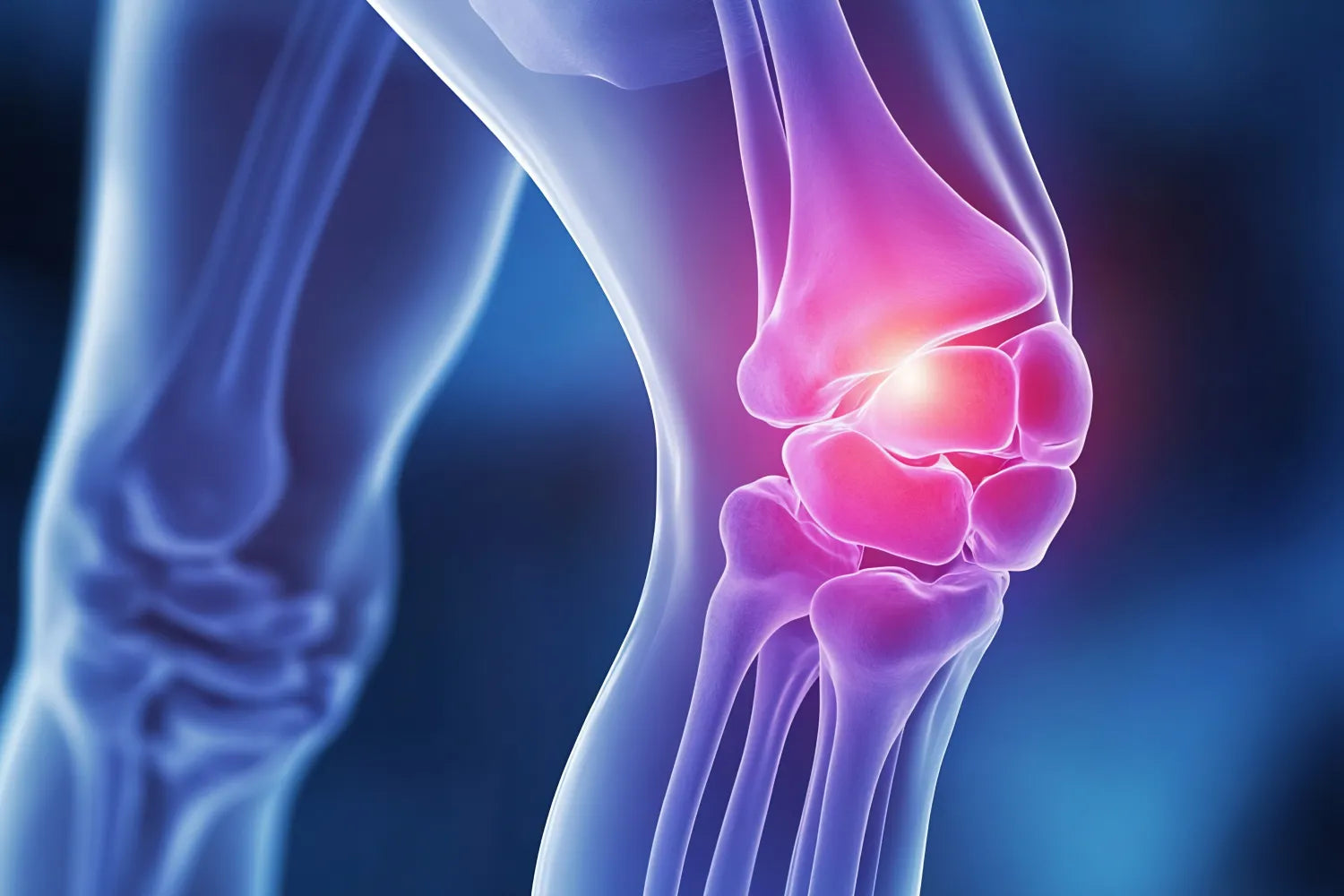Does Collagen Help Joints? A Look at the Science

Joint pain is the ultimate buzzkill. Whether it’s your knees creaking like an old staircase or your hips protesting every time you sit down, achy joints can make you feel decades older than you are.
If you can relate, then you might have heard that collagen is the thing to take for sore joints. But is it actually worth all the hype, or is it just another wellness fad? We’re here to break down the science and discuss how to use collagen for joint health.
What Is Collagen?
Collagen is basically your body’s version of duct tape. It’s the most abundant protein you’ve got, and it’s responsible for holding everything together — skin, bones, cartilage, tendons, and, yes, even your joints. It’s the scaffolding that keeps your body standing tall and moving smoothly, and there are many different types of collagen in your body.
Your body naturally makes collagen, but production slows down in your late twenties. That’s why your joints may feel creakier with age. It’s also the reason why many people take supplemental collagen.
Most products on the market use hydrolyzed collagen peptides, which are broken down into smaller chunks that your body can absorb more easily. These supplements can also come in many forms, from powders and drinks to gummies and capsules.
Can Collagen Help Joints? What the Science Says
Does collagen actually help joints, or is this just another case of wellness marketing gone wild? According to a growing stack of studies, collagen may really make a difference, especially if you’re dealing with mild joint pain. Clinical trials have shown that people who take hydrolyzed collagen or type II collagen often report less joint pain, better mobility, and improved comfort during everyday activities.
A 2025 randomized controlled trial even found that hydrolyzed collagen helped reduce pain and improve quality of life in people with knee pain. Other systematic reviews back this up, noting consistent, though modest, improvements in joint health.
The keyword here is modest. Collagen isn’t going to rebuild your joints overnight or replace a doctor’s treatment plan, but it can be helpful nonetheless.
How Does Collagen Work?
So, how does a scoop of collagen powder know where your joints are? When you consume collagen, your body breaks it down into amino acids and peptides.
Some of these bioactive peptides may circulate to your joint tissue, where they interact with cartilage-producing cells (called chondrocytes), encouraging them to build more collagen and proteoglycans (the stuff that cushions your joints).
With undenatured type II collagen, the mechanism is a little different. Instead of acting like building blocks, this form seems to work by training your immune system to ease off the gas, reducing overreactions that contribute to joint pain.
Of course, not every gram of collagen you eat is going straight to your knees. Most of it still gets digested and sent throughout the body like any other protein. But early research suggests enough of those special peptides may survive digestion to deliver joint-friendly benefits.
How Much Collagen Should You Take for Joints?
Most clinical studies on hydrolyzed collagen use doses ranging from 2.5 to 10 grams per day. People usually start noticing improvements somewhere between eight to 12 weeks of daily use. The good news is collagen has a pretty wide safety window, so you don’t need to stress about being ultra-precise.
That said, more isn’t always better. Your body can only use so much at once, and the rest is just… well, expensive protein. Consistency matters more than megadoses, so the key is picking a product you’ll actually take every single day.
What’s the Best Way To Take Collagen?
The “best” way to take collagen isn’t about capsules vs. powders vs. gummies — it’s about whatever you’ll actually stick with. Collagen works gradually, so consistency is everything.
You can take a pill, stir it into your smoothie, chew up a gummy, or toss it in your coffee. Speaking of coffee, our Mushroom Coffee+ makes this part ridiculously easy: it packs four grams of grass-fed bovine collagen per serving with no gel-like texture and no weird aftertastes.
And our formula doesn’t stop at collagen, either. It also includes adaptogens like lion’s mane and chaga for focus and immunity, plus L-theanine for relaxation.
When your wellness routine tastes this good, staying consistent with your morning collagen doesn’t feel like a chore. That’s why adding collagen to your daily cup is one of the most effective ways to stick with it long term.
Is Collagen Safe?
Collagen supplements are generally considered safe for most people. Side effects are rare and usually mild — think minor digestive upset, if anything. Unlike some trendy supplements that come with a laundry list of warnings, collagen has been tested in multiple studies without serious red flags.
That said, not all collagen powders are created equal. Since supplements aren’t heavily regulated by the FDA, it’s smart to choose brands that use third-party testing and clearly list their ingredients.
If you’re pregnant, breastfeeding, or managing a health condition, check in with your doctor before starting. And if you have allergies— especially to fish or shellfish — watch out for marine-sourced collagen. Otherwise, collagen is one of the safer bets in the supplement world.
The Bottom Line
So, does collagen help joints? The science says yes — at least for many people dealing with stiffness or pain. It’s not a miracle cure, but it’s a solid option that can support healthy and comfortable movement.
The key is finding a routine that makes daily use effortless, like stirring collagen into your morning coffee. And if you want to switch things up, hey, we know how to do that! Check out our mushroom coffee recipes for more inspiration on ways you can sneak collagen into your day.
Sources:
Should you take collagen supplements? | UCLA Health
Collagen supplementation in skin and orthopedic diseases: A review of the literature | ScienceDirect
Start your day
The Right Way









